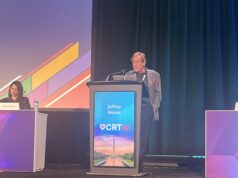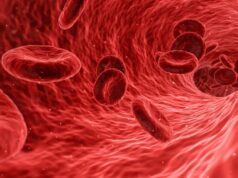
Preprocedural administration of an oral colchicine load does not reduce the risk of myocardial injury or 30-day major adverse cardiovascular events (MACE) in patients undergoing percutaneous coronary intervention (PCI), according to findings from the COLCHICINE-PCI (Effects of acute colchicine administration prior to percutaneous coronary intervention) clinical trial. However, the study concluded that colchicine could prevent vascular inflammation during an acute injury.
Binita Shah (VA New York Harbor Healthcare System and NYU School of Medicine; New York; USA) presented the findings of the trial on behalf of the COLCHICINE-PCI study team at the American Heart Association Scientific Sessions (AHA 2019; 16–18 November, Philadelphia, USA). The investigator-initiated, randomised, double-blinded, placebo-controlled, single-centre trial is the first to evaluate the effects of acute preprocedural administration of colchicine on markers of myocardial injury and inflammation in patients undergoing PCI.
The trial sought to identify the potential for colchicine—an anti-inflammatory drug which is primarily used in the treatment of gout—to reduce damage caused by opening up a blockage in the arteries of the heart, as well as the potential to reduce the risk of major adverse events following PCI. Properties of colchicine include inhibiting chemotaxis and activity in response to vascular injury, inhibiting inflammasome signalling and reducing neutrophil-platelet interaction and aggregation. Shah and colleagues hypothesised that an acute, pre-procedural oral administration of 1.8 mg of colchicine, administered one to two hours prior to procedure, would reduce biomarker evidence of PCI-related inflammation and myocardial injury when compared with placebo.
A total of 1,453 patients with suspected ischaemic heart disease or acute coronary syndromes referred for clinically-indicated coronary angiography with possible PCI, were eligible for inclusion in the study. After exclusion criteria were applied, 714 patients were enrolled, with 366 randomised to the colchicine group and 348 to the placebo group. Of those in the colchicine group, 206 underwent PCI, alongside 194 in the placebo group.
The primary outcome assessed through the trial was PCI-related myocardial injury, based on levels of troponin, with key secondary outcomes including mortality, non-fatal myocardial infarction or target vessel revascularization at 30 days. The study group found a 57.3% rate of PCI-related myocardial injury in the colchicine group (118), compared to 64.2% in the placebo group (122) (p=0.19). In terms of secondary outcomes, the study group noted an 11.7% (24) rate of 30-day major adverse cardiovascular events in the colchicine group, and 12.9% (25) in the placebo group (p=0.82).
COLCHICINE-PCI also assessed inflammatory biomarkers, looking at the difference in the change in plasma IL-6 and hsCRP concentrations from baseline to one hour, 6 hours, and 24 hours post-PCI. Shah and colleagues found that while the acute, pre-procedural dose of colchicine did not reduce PCI-related myocardial injury or MACE at 30 days, a PCI-related increase in IL-6 and hsCRP concentration was significantly attenuated at 24 hours post-PCI. Consequently, an earlier start to pre-procedural colchicine regimen warrants further investigation. COLCHICINE-PCI is the first study to demonstrate that an oral load of colchicine prevents a rise of inflammatory biomarkers in acute injury, according to Shah and colleagues.
Shah acknowledged that the trial was limited by a majority male population, while observations were limited to the selected acute pre-procedural dosing regimen, and the short-term time points for biomarkers of myocardial injury and inflammation.
Subodh Verma (University of Toronto; Toronto; Canada), who provided the discussant review for COLCHICINE-PCI, described the trial as a ‘well conducted and executed study’ and commented that more studies are needed targeting patients with residual inflammatory risk.
Funding for the COLCHICINE-PCI study came from the VA Career Development Award and the American Heart Association Clinical Research Mentored grant.













